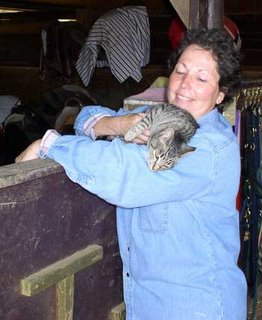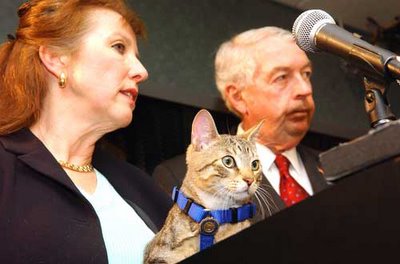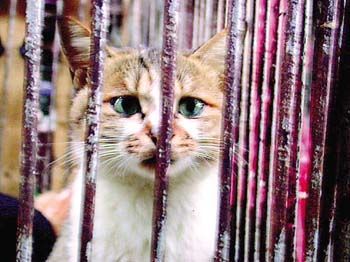Chairman Meow Finds a Home in a Barn and a Job as a Mouser on Texas Horse Ranch

Chairman Meow was born homeless and poor without prospects and with a limited life expectancy. His early days were spent living with about twenty-five other feral cats in a colony on the property of an elderly woman in Sanger, Texas. When the cats became too much for the woman to handle, she gave them to Barn Cats Inc. of Lewisville who in turn placed Chairman Meow with Diane Malone of Twin Fiddles Ranch just outside tiny Alvarado. Unlike many feral cats, the gray cat quickly adapted to life with Malone (See photo on the right) and the other ranch hands and for the past year he has been living in one of Malone's horse barns and working as a mouser.
If left unchecked, mice, other rodents, and snakes can wreak havoc on a farm. Not only do they consume and contaminate huge quantities of feed, but mice in particular can also spread deadly diseases to horses, cows, and dogs.
Converting feral cats into valuable working barn cats is not easy, however. Being by nature territorial, the cats must initially be confined to cages for up to four weeks in order to prevent them from returning to their old homes. In spite of this precaution, three of the four cats supplied to Twin Fiddles by Barn Cats ran off after they were released from captivity; only Chairman Meow remained. Moreover, since north Texas can be an especially dangerous place for outdoor cats, prospective owners must first meet certain preconditions before Barn Cats will allow them to adopt. For instance, they must have a closed-in barn for the cats to live in and either a Great Pyrenees or a donkey in order to scare away such feline predators as coyotes, owls, and hawks. The cats are also sterilized and vaccinated before being adopted.
Barn Cats, which was established in 2003 by Peggy Atkerson, found homes for 267 cats in 2004 and 410 felines last year. So far this year Atkerson has placed several cats from Lafayette, Louisiana who were displaced last year by Hurricane Rita. In addition to barn cats, Atkerson's agency also places a few indoor cats as well.
Since all but one of Malone's barn cats had died a year earlier, Chairman Meow's services as a mouser have been a godsend for the ranch. His friendliness has also converted him into every bit as much of a pet as he is a mouser. Overall, the arrangement has worked out very satisfactorily for both sides but Chairman Meow seems to be particularly pleased. "You won't find a more appreciative cat," ranch hand Donna Salmon told the Waxahachie Daily Light on February 2nd. (See "Working Cats.")
While the horse ranch is Alvarado may be suffering from a scarcity of cats, 1207 kilometers to the west a dude ranch in Dragoon, Arizona has a surplus of felines. When co-owners Linda and Mike Kelly and Daria and Doug Hobbs purchased the Triangle T Guest Ranch, located sixty miles from Tucson, last November they also inherited around one-hundred semi-feral cats from the previous owner.

Rather than resorting to the quick fix, i.e., extermination, the new owners have found homes for about seventy of the cats. Specifically, they have placed ten with the Humane Society, five with the Oasis Sanctuary for Birds near Benson, and the remainder with friends and family. They have also paid to have the felines trapped, sterilized, vaccinated and, in some cases, treated by a vet. They are now, however, pretty much tapped out. "We've paid out of our own pockets as much as we can, but it's overwhelming," Daria Hobbs told the Arizona Daily Star on January 13th. (See "Guest Ranch Has a Herd.")
The Baby Animal Rescue Koalition and Spay and Neuter Solutions, both of Tucson, have agreed to desex the remaining cats but the Hobbses and Kellys are asking the public for help in finding homes for them. Linda Kelly is shown above on the left with one of the ranch's resident felines.
One factor working in the cats' favor is the fact that most of them are pretty social. "All the guys I've taken to my home, they're all scared, but they let me pet them and now they are all social," Debbie Austin, who is assisting the owners with the rescue, told the Arizona Daily Star. "One little guy I've had three weeks and he was really scared, but now he follows me around the house," she added.
It is certainly not easy and it is not cheap, but as the experiences at the Twin Fiddles and the Triangle T ranches have demonstrated there are humane solutions to feline overpopulation. John Lennon once said that the "war is over if you want it" and likewise feline genocide will end when Americans want it to end.
Photos: Waxahachie Daily Light (Chairman Meow) and David Sanders, Arizona Daily Star (Linda Kelly and cat).










